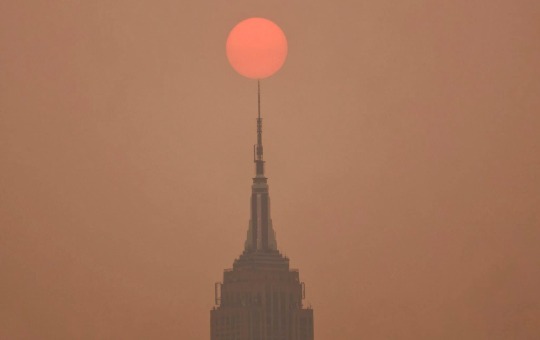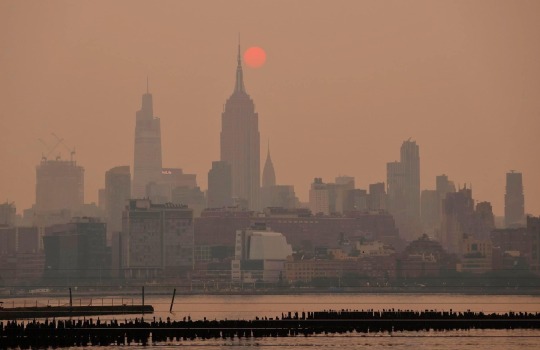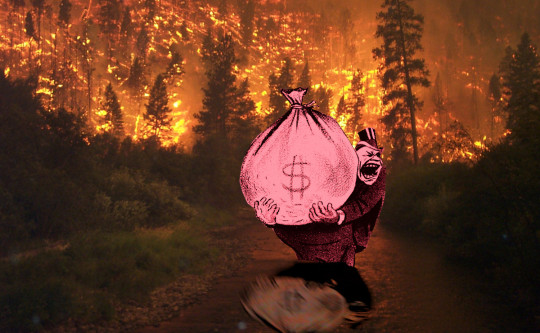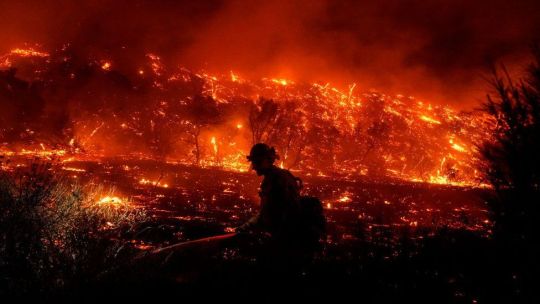#Canada wildfire
Text
Smoke from Canada
Please stay inside if you are sensitive to smoke
check your area for air quality:
PLEASE REBLOG AND SHARE MORE TIPS
I’m actively updating as of Wednesday
Jun 7, 2023. Please check your local news stations and weather apps for information on your area.
Outside
If you have to go outside please wear a mask, have lots of sunscreen and drink water when available/needed. Stay in shade when walking. Wear light colors outside, avoid dark colors. Cloth Masks are cool but paint/filter masks are your best friend. If you have a inhaler just bring it with you everywhere!
Inside
When inside don’t open windows and keep curtain closed to expel heat. Sandwiches and fruit are your friend. Cooking is far too hot. If you are about to run out of water fill tub with cold water and pray you have a good drain. Basements are your friend. DRINK WATER NOT SODA OR SPORTS DRINKS! Don’t use drier, use a clothes line if possible
Extra
if you are looking for shelter, Public libraries, coffee shops, grocery stores, anywhere thats air conditioned. Take anything you need but be SAFE
Did I mention water? Gatorade is fun but don’t drink caffeine.
If there’s no smoke in your area and you just need to cool down, open your window at night/early morning
|| Take it easy. No, easier than that. Aside from the mental toll the smoke and horrible weird light and the creepy red sun and the burning smell take on you, your body is just working way harder to do everything it normally does. You will be exhausted, you will be distracted, you will have headaches and you will struggle with basic tasks like "walking up stairs." Do not try to power through it. Cancel plans, reschedule appointments, do fewer errands or consolidate them into one trip.
Treat yourself like you have a cold. Plenty of fluids, stopping when you're tired, cough drops and eye drops for the painful throat and eyes, inhalers if you have one.
Spend as little time outside as you possibly can. This includes your pets. Do not open your windows, do not open your screen door, do not run your AC (this is where some of the above advice for hot weather will come in handy.)
If you have to go outside, wear an N95 or KN95 mask. Make sure it's well-fitted around your face. You're not trying to keep out the smoke, but the PM2.5 (particulate matter 2.5 microns or smaller.) That's the stuff that causes cancer.
If you have a fan with a HEPA filter, blast it all the time. If you don't have one go look at diy air filter link below, ask a mutual aid center if you cannot come into contact with these materials. || These tips are from them, a few links below are from them too so go give them some love. https://www.tumblr.com/salteywater
LINKS:
Diy Air Filter
Smoke Tips & Safety
Google Docs, being updated currently
Diy Sun Reflector
More tips
#Heat tips#Fire tips#canada fires#Canada fire#canada wildfires#Canada wildfire#climate crisis#natural disasters#Forest Fires#mutual aid#lgtbq community#crust punk#anarchism#air pollution#air pollutants#Nova Scotia fires#alberta wildfires#Heavy Smoke#Fire Crews#bush fire#enviromental#environmental activism#climate activst#climate activism#Canada#Canada is burning#reblog to save a life#reblog this plz#reblog#solar punk
458 notes
·
View notes
Photo

I can’t believe I’m saying this, but the sky outside my window is yellow, I can’t see the sun, I can smell smoke even though I have every window closed and various heavy-duty air filters on, and my throat is dry and aching even though I haven’t been outside. Apocalypse now?
58 notes
·
View notes
Text
FYI If You Live in Certain Parts of the U.S. and Canada
Various areas of Canada and the U.S. are being impacted by wildfires in Quebec right now. Yesterday (June 6, 2023), New York City had the worst air quality of any city in the world. There has been a haze over many areas (including in the northeast, midwest, and mid-Atlantic regions of the U.S.) for around two days now and people can even smell smoke.
The air quality in many areas is equivalent to smoking at least 7 cigarettes per day (though I'm unclear how long you'd have to be outside to get the full amount of cigarettes). The poor air quality is bad for everyone, and especially bad for vulnerable groups such as children, seniors, pregnant people, pets, and those with chronic health issues (including asthma and heart problems).
If you live in these areas, avoid going outside whenever possible. Wear a high-quality mask (ie: N95 - dust and surgical masks won't do anything) if you have to go out. Keep windows shut, turn on air purifiers, definitely don't exercise outside, etc. Find a website such as a news outlet or weather channel (ie: accuweather) that tracks the air quality in your area to see when your air quality returns to normal.
I encourage everyone to look into this further if you have any specific questions about your personal situation. Stay safe and healthy, everyone!
A couple sources:
#air quality#wildfires#quebec#new jersey#pennsylvania#health#health risk#health alert#smoke#haze#canada#canada wildfire#news#northeast#midwest#nyc
57 notes
·
View notes
Text
our area is in the red zone, very close to purple zone for air quality and it smells like smoke everywhere. i cant imagine how bad it is for Canadians so to any Canadians [ or anyone else affected ] my heart goes out to you, stay safe!!!
15 notes
·
View notes
Text
I feel like I'm about to pass out from all this Canada wildfire smoke. The sky in NY is fucking orange and very apocalyptic with all the sky lights on in the middle of the day.
My body wants to do a big breath but I can't and my nose HURTS.
9 notes
·
View notes
Text
Harsh weather conditions are fueling these fast-spreading fires, making them extremely difficult to combat.
The country is currently at "national preparedness level 5," meaning Canada has fully committed all its national resources to mobilize the fight against the fires.
Chris Stockdale, a wildland fire research officer with the Canadian Forest service, told CBS News late last month that as part of that "level 5" declaration, "international liaison officers" from Australia, New Zealand and South Africa are flying in to help fight the fires.
11 notes
·
View notes
Text
The Silent Hill haze is creeping into Indiana now.
3 notes
·
View notes
Text
Dear Canada
Please stop sending smoke over to new england. It smells like smoke, the air is yellow, and the sun is blood red. Thanks in advance :)
(Seriously though, best of luck to those in all affected areas!! Does anyone have any ways people who are far from the wildfire can help?)
3 notes
·
View notes
Text
funds for indigenous communities affected by the canada wildefires *updated*
grassy narrows first nations (ontario) needs funds for an escape route
odawa first nations (quebec-ontario) is raising funds for evacuees
algonquins of barriere (mitchikanibikok inik in alberta) lake mutual aid request
you can drop donations for the odawa first nations at 815 st laurent blvd in ottawa
you can drop off food donations for mitchikanibikok inik at the ramada plaza in gatineau; you can also email info/@/health.rapidlake.com with mutual aid donations. please note that the maniwaki native friendship center is now closed to donations
if you’re directly affected, the pueblo action alliance has developed a guide for DIY filtration for the smoke
updates (as of 6 june 2023):
donate funds for evacuees from little red river cree nation (via kahkakow)
k'atl'odeeche first nations needs funds to rebuild homes and businesses lost (via aelabee)
i’ll update this as i find more fundraising initiatives and please free to share your own. reblogs with anything than sharing resources/mutual aid requests/fundraising opportunities get blocked.
#canada wildfires#mutual aid#fundraising#indigenous#signal boost#for the sake of this post i am a white canadian settler and have not see any comprehensive list on this website yet which is why im posting
29K notes
·
View notes
Text
living as a Canadian in a small town the past 5-7 summers has just been. When will it reach me. How long will we continue to be lucky. What do I need in a suitcase. When will it be me. And that’s just climate change! 🔥
#no but hearing about rural houses near your town going up/fires sprouting everywhere is just#a constant game of horrifying roulette#canada#wildfires#canada wildfire
1 note
·
View note
Text



Canadian wildfire smoke creates hazy skies and unhealthy polluted air quality in New York City (2023)
The sun is shrouded as it rises in a hazy, smoky sky behind the Empire State Building, One Vanderbilt and the Chrysler Building in NYC.
10K notes
·
View notes
Text
Greenwashing set Canada on fire

On September 22, I'm (virtually) presenting at the DIG Festival in Modena, Italy. On September 27, I'll be at Chevalier's Books in Los Angeles with Brian Merchant for a joint launch for my new book The Internet Con and his new book, Blood in the Machine.

As a teenager growing up in Ontario, I always envied the kids who spent their summers tree planting; they'd come back from the bush in September, insect-chewed and leathery, with new muscle, incredible stories, thousands of dollars, and a glow imparted by the knowledge that they'd made a new forest with their own blistered hands.
I was too unathletic to follow them into the bush, but I spent my summers doing my bit, ringing doorbells for Greenpeace to get my neighbours fired up about the Canadian pulp-and-paper industry, which wasn't merely clear-cutting our old-growth forests – it was also poisoning the Great Lakes system with PCBs, threatening us all.
At the time, I thought of tree-planting as a small victory – sure, our homegrown, rapacious, extractive industry was able to pollute with impunity, but at least the government had reined them in on forests, forcing them to pay my pals to spend their summers replacing the forests they'd fed into their mills.
I was wrong. Last summer's Canadian wildfires blanketed the whole east coast and midwest in choking smoke as millions of trees burned and millions of tons of CO2 were sent into the atmosphere. Those wildfires weren't just an effect of the climate emergency: they were made far worse by all those trees planted by my pals in the eighties and nineties.
Writing in the New York Times, novelist Claire Cameron describes her own teen years working in the bush, planting row after row of black spruces, precisely spaced at six-foot intervals:
https://www.nytimes.com/2023/09/15/opinion/wildfires-treeplanting-timebomb.html
Cameron's summer job was funded by the logging industry, whose self-pegulated, self-assigned "penalty" for clearcutting diverse forests of spruce, pine and aspen was to pay teenagers to create a tree farm, at nine cents per sapling (minus camp costs).
Black spruces are made to burn, filled with flammable sap and equipped with resin-filled cones that rely on fire, only opening and dropping seeds when they're heated. They're so flammable that firefighters call them "gas on a stick."
Cameron and her friends planted under brutal conditions: working long hours in blowlamp heat and dripping wet bulb humidity, amidst clouds of stinging insects, fingers blistered and muscles aching. But when they hit rock bottom and were ready to quit, they'd encourage one another with a rallying cry: "Let's go make a forest!"
Planting neat rows of black spruces was great for the logging industry: the even spacing guaranteed that when the trees matured, they could be easily reaped, with ample space between each near-identical tree for massive shears to operate. But that same monocropped, evenly spaced "forest" was also optimized to burn.
It burned.
The climate emergency's frequent droughts turn black spruces into "something closer to a blowtorch." The "pines in lines" approach to reforesting was an act of sabotage, not remediation. Black spruces are thirsty, and they absorb the water that moss needs to thrive, producing "kindling in the place of fire retardant."
Cameron's column concludes with this heartbreaking line: "Now when I think of that summer, I don’t think that I was planting trees at all. I was planting thousands of blowtorches a day."
The logging industry committed a triple crime. First, they stole our old-growth forests. Next, they (literally) planted a time-bomb across Ontario's north. Finally, they stole the idealism of people who genuinely cared about the environment. They taught a generation that resistance is futile, that anything you do to make a better future is a scam, and you're a sucker for falling for it. They planted nihilism with every tree.
That scam never ended. Today, we're sold carbon offsets, a modern Papal indulgence. We are told that if we pay the finance sector, they can absolve us for our climate sins. Carbon offsets are a scam, a market for lemons. The "offset" you buy might be a generated by a fake charity like the Nature Conservancy, who use well-intentioned donations to buy up wildlife reserves that can't be logged, which are then converted into carbon credits by promising not to log them:
https://pluralistic.net/2020/12/12/fairy-use-tale/#greenwashing
The credit-card company that promises to plant trees every time you use your card? They combine false promises, deceptive advertising, and legal threats against critics to convince you that you're saving the planet by shopping:
https://pluralistic.net/2021/11/17/do-well-do-good-do-nothing/#greenwashing
The carbon offset world is full of scams. The carbon offset that made the thing you bought into a "net zero" product? It might be a forest that already burned:
https://pluralistic.net/2022/03/11/a-market-for-flaming-lemons/#money-for-nothing
The only reason we have carbon offsets is that market cultists have spent forty years convincing us that actual regulation is impossible. In the neoliberal learned helplessness mind-palace, there's no way to simply say, "You may not log old-growth forests." Rather, we have to say, "We will 'align your incentives' by making you replace those forests."
The Climate Ad Project's "Murder Offsets" video deftly punctures this bubble. In it, a detective points his finger at the man who committed the locked-room murder in the isolated mansion. The murderer cheerfully admits that he did it, but produces a "murder offset," which allowed him to pay someone else not to commit a murder, using market-based price-discovery mechanisms to put a dollar-figure on the true worth of a murder, which he duly paid, making his kill absolutely fine:
https://pluralistic.net/2021/04/14/for-sale-green-indulgences/#killer-analogy
What's the alternative to murder offsets/carbon credits? We could ask our expert regulators to decide which carbon intensive activities are necessary and which ones aren't, and ban the unnecessary ones. We could ask those regulators to devise remediation programs that actually work. After all, there are plenty of forests that have already been clearcut, plenty that have burned. It would be nice to know how we can plant new forests there that aren't "thousands of blowtorches."
If that sounds implausible to you, then you've gotten trapped in the neoliberal mind-palace.
The term "regulatory capture" was popularized by far-right Chicago School economists who were promoting "public choice theory." In their telling, regulatory capture is inevitable, because companies will spend whatever it takes to get the government to pass laws making what they do legal, and making competing with them into a crime:
https://pluralistic.net/2022/06/13/public-choice/#ajit-pai-still-terrible
This is true, as far as it goes. Capitalists hate capitalism, and if an "entrepreneur" can make it illegal to compete with him, he will. But while this is a reasonable starting-point, the place that Public Choice Theory weirdos get to next is bonkers. They say that since corporations will always seek to capture their regulators, we should abolish regulators.
They say that it's impossible for good regulations to exist, and therefore the only regulation that is even possible is to let businesses do whatever they want and wait for the invisible hand to sweep away the bad companies. Rather than creating hand-washing rules for restaurant kitchens, we should let restaurateurs decide whether it's economically rational to make us shit ourselves to death. The ones that choose poorly will get bad online reviews and people will "vote with their dollars" for the good restaurants.
And if the online review site decides to sell "reputation management" to restaurants that get bad reviews? Well, soon the public will learn that the review site can't be trusted and they'll take their business elsewhere. No regulation needed! Unleash the innovators! Set the job-creators free!
This is the Ur-nihilism from which all the other nihilism springs. It contends that the regulations we have – the ones that keep our buildings from falling down on our heads, that keep our groceries from poisoning us, that keep our cars from exploding on impact – are either illusory, or perhaps the forgotten art of a lost civilization. Making good regulations is like embalming Pharaohs, something the ancients practiced in mist-shrouded, unrecoverable antiquity – and that may not have happened at all.
Regulation is corruptible, but it need not be corrupt. Regulation, like science, is a process of neutrally adjudicated, adversarial peer-review. In a robust regulatory process, multiple parties respond to a fact-intensive question – "what alloys and other properties make a reinforced steel joist structurally sound?" – with a mix of robust evidence and self-serving bullshit and then proceed to sort the two by pantsing each other, pointing out one another's lies.
The regulator, an independent expert with no conflicts of interest, sorts through the claims and counterclaims and makes a rule, showing their workings and leaving the door open to revisiting the rule based on new evidence or challenges to the evidence presented.
But when an industry becomes concentrated, it becomes unregulatable. 100 small and medium-sized companies will squabble. They'll struggle to come up with a common lie. There will always be defectors in their midst. Their conduct will be legible to external experts, who will be able to spot the self-serving BS.
But let that industry dwindle to a handful of giant companies, let them shrink to a number that will fit around a boardroom table, and they will sit down at a table and agree on a cozy arrangement that fucks us all over to their benefit. They will become so inbred that the only people who understand how they work will be their own insiders, and so top regulators will be drawn from their own number and be hopelessly conflicted.
When the corporate sector takes over, regulatory capture is inevitable. But corporate takeover isn't inevitable. We can – and have, and will again – fight corporate power, with antitrust law, with unions, and with consumer rights groups. Knowing things is possible. It simply requires that we keep the entities that profit by our confusion poor and thus weak.
The thing is, corporations don't always lie about regulations. Take the fight over working encryption, which – once again – the UK government is trying to ban:
https://www.theguardian.com/technology/2023/feb/24/signal-app-warns-it-will-quit-uk-if-law-weakens-end-to-end-encryption
Advocates for criminalising working encryption insist that the claims that this is impossible are the same kind of self-serving nonsense as claims that banning clearcutting of old-growth forests is impossible:
https://twitter.com/JimBethell/status/1699339739042599276
They say that when technologists say, "We can't make an encryption system that keeps bad guys out but lets good guys in," that they are being lazy and unimaginative. "I have faith in you geeks," they said. "Go nerd harder! You'll figure it out."
Google and Apple and Meta say that selectively breakable encryption is impossible. But they also claim that a bunch of eminently possible things are impossible. Apple claims that it's impossible to have a secure device where you get to decide which software you want to use and where publishers aren't deprive of 30 cents on every dollar you spend. Google says it's impossible to search the web without being comprehensively, nonconsensually spied upon from asshole to appetite. Meta insists that it's impossible to have digital social relationship without having your friendships surveilled and commodified.
While they're not lying about encryption, they are lying about these other things, and sorting out the lies from the truth is the job of regulators, but that job is nearly impossible thanks to the fact that everyone who runs a large online service tells the same lies – and the regulators themselves are alumni of the industry's upper eschelons.
Logging companies know a lot about forests. When we ask, "What is the best way to remediate our forests," the companies may well have useful things to say. But those useful things will be mixed with actively harmful lies. The carefully cultivated incompetence of our regulators means that they can't tell the difference.
Conspiratorialism is characterized as a problem of what people believe, but the true roots of conspiracy belief isn't what we believe, it's how we decide what to believe. It's not beliefs, it's epistemology.
Because most of us aren't qualified to sort good reforesting programs from bad ones. And even if we are, we're probably not also well-versed enough in cryptography to sort credible claims about encryption from wishful thinking. And even if we're capable of making that determination, we're not experts in food hygiene or structural engineering.
Daily life in the 21st century means resolving a thousand life-or-death technical questions every day. Our regulators – corrupted by literally out-of-control corporations – are no longer reliable sources of ground truth on these questions. The resulting epistemological chaos is a cancer that gnaws away at our resolve to do anything about it. It is a festering pool where nihilism outbreaks are incubated.
The liberal response to conspiratorialism is mockery. In her new book Doppelganger, Naomi Klein tells of how right-wing surveillance fearmongering about QR-code "vaccine passports" was dismissed with a glib, "Wait until they hear about cellphones!"
https://pluralistic.net/2023/09/05/not-that-naomi/#if-the-naomi-be-klein-youre-doing-just-fine
But as Klein points out, it's not good that our cellphones invade our privacy in the way that right-wing conspiracists thought that vaccine passports might. The nihilism of liberalism – which insists that things can't be changed except through market "solutions" – leads us to despair.
By contrast, leftism – a muscular belief in democratic, publicly run planning and action – offers a tonic to nihilism. We don't have to let logging companies decide whether a forest can be cut, or what should be planted when it is. We can have nice things. The art of finding out what's true or prudent didn't die with the Reagan Revolution (or the discount Canadian version, the Mulroney Malaise). The truth is knowable. Doing stuff is possible. Things don't have to be on fire.



If you'd like an essay-formatted version of this post to read or share, here's a link to it on pluralistic.net, my surveillance-free, ad-free, tracker-free blog:
https://pluralistic.net/2023/09/16/murder-offsets/#pulped-and-papered
#pluralistic#logging#pulp and paper#ontario#greenwashing#a market for lemons#incentives matter#capitalism#late-stage capitalism#climate emergency#wildfires#canada#canpoli#ontpoli#carbon offsets#self-regulation#nerd harder#epistemological chaos#regulatory capture#Claire Cameron#pines in lines
3K notes
·
View notes
Text
Help For Canada

Here are some ways to help out some of the Canadians who's lives have been forever changed by the wildfires. (From @mugsy, someone who's there, in the country, and feeling pretty damn scared.)
United Way Halifax (https://www.unitedwayhalifax.ca/give/united-way-halifax-wildfire-recovery-appeal/)
Alberta.ca Disaster Assistance (https://www.alberta.ca/disaster-assistance-and-recovery-support.aspx)
RedCross.ca Disaster Assistance (https://www.redcross.ca/how-we-help/current-emergency-responses/atlantic-canada-wildfire-responses)
And a GoFundMe for their coworker (https://gofund.me/f30934aa)
4K notes
·
View notes
Text
Already 3.3 million hectares of land in Canada has been burning because of the extreme heat and dryness and it’s not even halfway through wildfires season. They’re actually predicting this will be the most destructive wildfire season in Canadian history. But most of what I’ve seen posted about these fires has to do with air quality. So I’ve decided to try and compile a list of resources to donate to help Canadians being affected at this time.
Alberta
The Red Cross which seems to have a donation page for most provinces. Both the Canadian and Alberta government will match each dollar of your donation.
Food Banks Alberta helping to feed those affected.
Disaster Aid Canada general help
Atlantic Canada
The Red Cross which if you donate to both the Canadian and the Nova Scotia government will match each dollar of your donation.
British Columbia
United Way BC supporting communities by giving them things such as food, mental health support, and shelter.
Food banks BC helping to feed those affected.
Canada as a whole
Unite for Change not directly donating to the fires but is working to make changes at a provincial and federal level to help fix the climate crisis which is directly making the fires worse.
Please tell me if you know of any other places taking donations to help either put out the fires or help the people affected. If any of these donation links are also donating to discriminatory policies or such like anti-trans legislation's please inform me so I can remove the link!
Quebec and Ontario links are especially wanted as I couldn't find anything for there and neither could my friend.
#paperuniverse post#canada#canadian politics#politics#wildfires#united states#america#boost#important
4K notes
·
View notes
Text
btw lets not blame Canada considering they are definitely going through worse. yes, the air quality is horrible, but Canada is definitely being hit the hardest considering they are the ones having wildfires
12 notes
·
View notes
Text

My air quality is hovering in the 150s, my sister just texted me where she is literally 1 hr away the air quality is 250+.
It down poured yesterday and made it worse.
Help, I wanna breathe.
#fire#canada#canadian fire#wild fire#canada fire#canada wildfire#Canadian wildfire#wildfire#canadian
5 notes
·
View notes